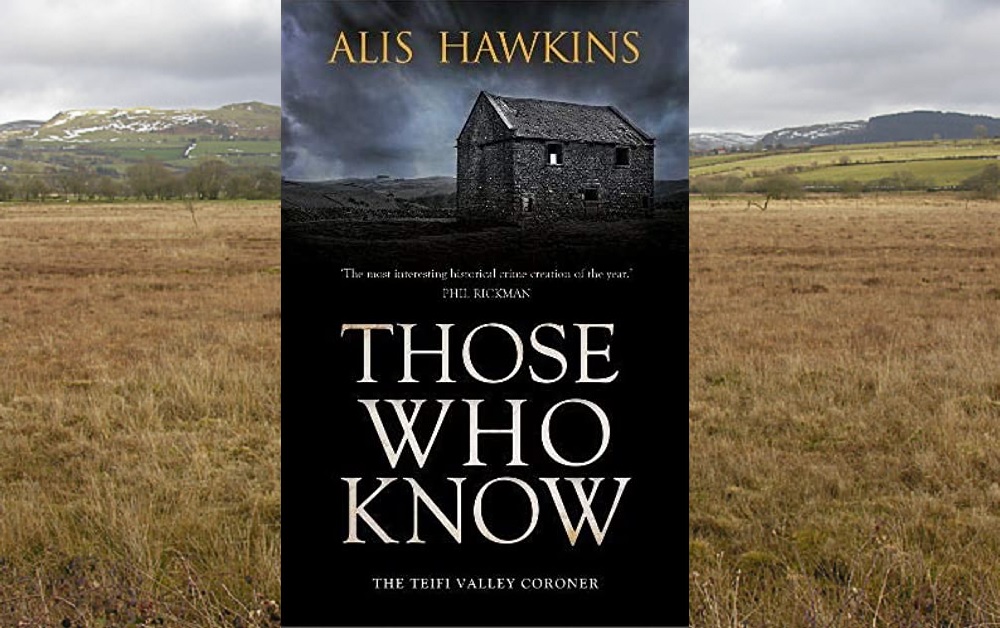Review: Those Who Know soaks what could be dry history in mud and beer and blood

Sarah Tanburn
The upper Teifi valley in 1851 is not the obvious setting for a murder plot littered with pornography and homosexuality. Hawkins pulls it off with a contortionist of a tale.
Harry Probert-Lloyd is the acting coroner of the district standing for election to the permanent post, when he is called to the death of a local teacher. Probert-Lloyd was a London barrister till increasing blindness pushed him home, where he has discovered his vocation: finding how people died and where necessary bringing killers to justice. Of course, in the time-honoured tradition, he has an assistant in the shape of John Davies, but for once the sidekick has as much to say as the star. Alternating chapters tell each man’s story, giving different perspectives on the action.
Schoolmaster Rowland’s demise is at first sight straightforward: he fell backwards off a ladder. Quickly though, Harry discovers neither his life nor death were so simple. The investigation becomes entangled with his race for election and he gives neither quite enough focus, jeopardising much he holds dear.
Bustle and brouhaha
Hawkins paints a busy picture of rural Wales in the grip of rapid change. There is plenty of travel – to London in particular – but the action centres on the small towns and villages of the area. The cities are hotbeds of vice, almost incomprehensible to John, but the might of Empire and the roar of the steam train has reached Carmarthen and with their hot breath come new ambitions: the vote, education, rights for women.
The contrast is intense. The villagers loved Rowlands and they start by believing another old man is guilty. They bring out the ceffyl pren, a local form of summary justice which calls on the accused and parades him around the streets on a wooden horse. The swinging lamps, the sheet and loud voices in the dark are reminiscent of a much older tradition allowed to continue even as the beginning of forensic medicine and a transparent court system take hold.
The story unfolds in the shadow of the Brad y Llyfrau Gleision, the treachery of the Blue Books. For those unfamiliar with the Books, the education report of 1847 is a fundamental pivot in the nation’s history. The House of Commons was concerned about unrest in a country still largely Welsh speaking, and sent three English-monoglot Anglican commissioners to investigate education. Teaching, especially for ordinary people, was indeed poor, but the reports used damning language about Welsh, Nonconformity and the morals of the Welsh people in general. They were a turning point; the wounds to Welsh pride are still sensitive today.
The Blue Books are relevant to Rowland’s death, and Hawkins gently teaches us a lot about the educational ambitions of small towns at the time. How schools are funded, the quality of buildings and qualifications of teachers are at the heart of the tale, while both Harry and John know that switching between English and Welsh is an important part of their success as detectives. Hawkins soaks this apparently dry history in mud and beer and blood and shows us how desperate people can turn to depravity to escape the confines imposed by class and sex.
Sex and the Mabinogi
The great Celtic tales also play a surprising part in this mystery. John is shamed by the realisation that he knows less of his own country’s legends than he does of the Odyssey, and yet finds the Greek story helpful. Shaken by his London discoveries he reflects that, in the highly coloured version of the Mabinogi he has just read, “the women had stepped out of the shadows cast by the men, grabbed hold of the stories by the scruff of the neck and shaken them into a different shape … they were the Odysseus of the tales while the men were all more or less Achilles. The women did the thinking and manipulating while the men did the acting.”
It is no accident that sexual behaviour and its economic outcomes are at the root of this insight. Sex is, of course, everywhere in the valley. What is different about Harry and John’s world is the possibility that women are equal – intellectually, financially and sexually – despite the constraints of chapel, children and inheritance. Hawkins vividly explores this revolutionary notion, strongly espoused by Harry, using it in unexpected ways to drive the plot.
I enjoyed this element, though I would have liked to understand the women more. The structure of the story, told by Harry and John, means that the many interesting female characters remain more or less baffling. Because the narrators do not understand them, neither do we. Maybe in future episodes of this unusual detective pair, some of the women she gives us will themselves step out of the men’s shadows and tell us their stories directly.
A growing series
This is the third in the Teifi Valley Coroner series. Hawkins shows us some familiar conventions in the uneasy relationship of Harry and John and their unexpected love interests, a well-realised historical setting and the steep-sided valleys. Nonetheless, she gives us a fresh take on the well-trodden mid-nineteenth century and in particular the multi-layered charge of political reform.
If you haven’t come across the books yet, they are to be commended especially in these difficult times. We all need those stories which give us new material to chew on without making us feel even more apocalyptically threatened. An excellent winter hideaway read.
Those Who Know is published by Dome Press and can be bought here.
Support our Nation today
For the price of a cup of coffee a month you can help us create an independent, not-for-profit, national news service for the people of Wales, by the people of Wales.






